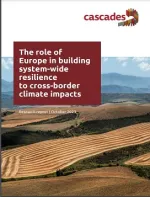The role of Europe in building system-wide resilience to cross-border climate impacts

CASCADES Research Paper (October 2023)
This report discusses how the European Union (EU) and the EU member states, in particular Germany and Spain, individually, collectively, and through their cooperation with international organisations, address cascading and cross-border climate impacts originating in agri-food systems in third countries with close ties to Europe. It finds that the EU and its member states have a rich array of policy frameworks and instruments to support climate adaptation in agri-food systems in partner countries to alleviate cascading impacts.
Nevertheless, there are gaps in the current European institutional architecture, foreign policy, development instruments and modalities to help build system-wide adaptation and, ultimately, system-wide resilience as a response to cascading and cross-border climate impacts. One reason is that traditional frameworks and policy processes on climate change impacts and adaptation define responses to climate impacts as either a sectoral or local challenge, primarily within national borders. Specifically, European actors face four strategic challenges to respond coherently, consistently and effectively to cascading and cross-border climate impacts: (1) Knowledge of cascading and cross-border climate impacts is still poor. Even less is known about what appropriate tools Europe could use and which measures to take to address them; (2) Policy incoherence, affecting adequate adaptation action, is a strategic problem; (3) Broad multi-level and multi-actor collaboration is missing; (4) Unilaterally closing the adaptation finance gap remains a daunting challenge for Europe.
As a way forward, this report presents a conceptual response framework that offers a comprehensive method for adaptation planners and policymakers in countries affected by cross-border climate impacts to identify, design, and filter adaptation responses suitable for different systems and levels. Furthermore, the various case study chapters in this report present concrete policy recommendations on how the EU and its member states, individually, jointly, and in their cooperation with international organisations, can ultimately work towards system-wide resilience in the face of cascading and cross-border climate impacts.